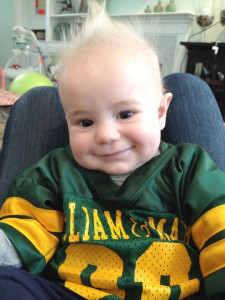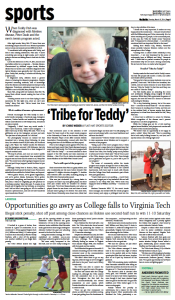After eight weeks, Mary Fish ’07 knew there was something unique about her son. Medical specialists were at a loss and answers proved difficult to find.
“It manifested with eating issues with Teddy, and then it was missing milestones,” Fish said. “I knew something was wrong at eight weeks, and I started going to doctors and asking them to look into it a little further.”
Late in the afternoon on Nov. 14, 2013, doctors and specialists settled on a prognosis — Menkes disease. Characterized by deficient copper levels, Menkes disease has no known cure. Children diagnosed with typical Menkes cases generally don’t live past three years. Teddy Fish, turning 11 months old Sunday, has a typical case.
If diagnosed early, children stand a greater chance of slowing the disease’s progression. Despite improved screening methods, lack of knowledge about the disease and subtle symptoms hamper early diagnoses. Prevalence estimates range from one in 100,000 to one in 450,000, Mary Fish said. Mary Fish, along with her husband Alex Fish ’06, turned their efforts toward making the best of the situation.

“Nothing means more to me than trying to raise awareness for this right now, since we can’t save Teddy,” Mary Fish said. “We’ve heard that from numerous doctors.”
‘All of a sudden it became a phenomenon’
Friends encouraged the Fish family to start a social media campaign. A Facebook page, Instagram account, Twitter handle and website all encourage visitors and followers to tell Teddy’s story. Donations are also accepted.
“Originally, I didn’t have any social media. I didn’t have Facebook, I didn’t have Instagram — I didn’t have any of that,” Mary Fish said. “One of my girlfriends set up the Instagram account and said, ‘You just have to take pictures.’ So I did that.”
The photography became an instant hit that translated into a strong virtual following. At press time, the website showed 50,264 visits, the Facebook page 2,195 “likes,” the Twitter handle 242 followers and the Instagram account 1,026 followers. Just shy of $19,000 has been donated to a fund designed to support medical costs.
“We kept it private, and once we made it public we couldn’t even comprehend how wonderful the support was and how much it meant to us,” Mary Fish said. “You never know what’s going to happen in your life, and you’d hope [support] would be there for you as well.”
Although Teddy lives in Boston, Mass., support quickly stretched beyond the East Coast. Photos were submitted from within the United States, and beyond.
“We’ve gotten Yemen, we’ve gotten Afghanistan, and we’ve gotten Alaska, Botswana. We’ve gotten pretty much everything, and hundreds of pictures at this point. I think we originally got 250 [photos] for a birthday surprise,” Mary Fish said. “A couple of my friends put it together for my birthday, as a surprise, and I had no idea it was going on. All of a sudden it became a phenomenon, and now we have hundreds upon hundreds of them.”
That movement came to the attention of Jeff Kader ’05, head coach of the men’s tennis program at the University of Texas at San Antonio. Kader, the Most Valuable Player of the 2005 Colonial Athletic Association Championship, roomed with Alex Fish during their time on the William and Mary squad.
Prior to the College’s match against UTSA Feb. 23, Kader and head coach Peter Daub discussed ways to support the Fish family. The Tribe men’s program will host “Tribe for Teddy” — an event intended to show support of the Fish family and raise awareness of Menkes — Mar. 23 at 10 a.m. before its match against James Madison at the Millie West Tennis Center.
‘You’re still a part of the program’
Daub remembers Alex Fish as a gutsy athlete, one who consistently put his team before himself. Fish registered 51 singles victories alongside 71 doubles wins between 2001 and 2005, including playing on the 2005 CAA Championship squad.
“Alex was just motivated by a strong desire to compete. He wasn’t my most gifted player, but there were just certain times he wouldn’t be denied,” Daub said. “He’s from Massachusetts, and when we played Brown he was down a set and down a break and just wasn’t going to be denied. Two years later, when Brown University came down here, [Alex] had a fractured finger and [he] said ‘I’m still playing.’ He went out and played with a one-hand backhand and still won the match.”
Daub sees the “Tribe for Teddy” event as a chance to raise awareness about Menkes and to support a member of his program.
“Being a part of the men’s program here, I think it’s a bond and a cause that a lot of players have that links themselves to all other players who have played. I think ‘One Tribe, One Family’ pretty much pertains to when you’re here,” Daub said. “This is ‘Once a part of the Tribe, always a part of the Tribe.’ Even though you’ve graduated and gone on, you’re still a part of our program.”
The sense of community within the tennis program and campus at large isn’t lost on Mary Fish. After meeting her future husband at the Ludwell Apartments, both have kept in touch with friends from the College.
Even Daub remained a part of their lives post-graduation.
“Coach Daub was in our wedding — coach Daub was a very integral part of my husband’s life and will continue to be,” Mary Fish said. “We’re both very happy we went to William and Mary — it means a lot to us.”

Mariana Navarrete MBA ’15, the men’s tennis team manager, has worked with the tennis program since January and enjoys a privileged look into the day-to-day activities of the team.
“I think this is very important. It makes me very happy about the tennis team — they are very involved with the Williamsburg and Tribe community. It’s a lot about reaching out to people, to the community and, in this case, the ‘Tribe for Teddy’ event,” Navarrete said. “It happened to a former player — I can tell how emotional and how important this is for the team.”
Hailing from Mexico City, Mexico, Navarrete draws parallels between Mexican culture and the atmosphere at the College.
“Coming from a culture where solidarity is very important … I am very impressed by the sense of community here at William and Mary,” Navarrete said. “I think this is a perfect occasion for people to demonstrate why we are such a strong community. We are here for them, no matter what happens.”
‘A wall of “Tribe for Teddy”’
Sunday marks the first event held in Teddy’s name. The first 100 people will receive a t-shirt, and coffee and Danish will be provided.
“Our goal is to have as many students come out as possible,” Daub said. “We’ll have free breakfast, free t-shirts, and [we want] everyone to wear these shirts that say ‘Tribe for Teddy.’ So that Alex and Mary can see a wall of ‘Tribe for Teddy.’”
The Fish family plans on attending the event and anticipates bringing along roughly 30 family members. While Mary Fish appreciates the gesture of support, she sees the event as a chance to advocate early testing for Menkes.
“It’s a very frustrating journey, but at the same time — now that we know what it is — it’s our mission that if anyone is reading about Teddy, and they are in the medical field, or knows anyone that shows symptoms, to at least have them tested for this,” Mary Fish said.
A blood test is sufficient to screen for Menkes. While recognition of the disease won’t prevent symptoms, it can slow progressions.
While the College gets set for a CAA matchup against James Madison, both players and coaches will be aware of the emotional backdrop.
“We haven’t had an opportunity to be happy in quite a while,” Mary Fish said. “This is something we’re both really looking forward to, and [we] can’t say that about a lot of things right now.”

